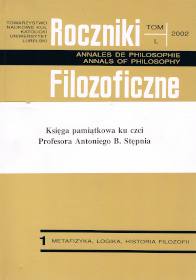The truth of freedom. Remarks occasioned by John Paul II's encyclical Veritatis splendor
Abstract
The article considers the problem of relations between freedom, intellect and will in the context of Christian philosophy, and especially in the sphere of Karol Wojtyła's thought. The author comes to the following conclusions. Complete freedom is the so-called 'freedom to', that is freedom to do good for other people. Good acts are acts consistent with the conscience of the acting person as well as with rational premises. 'Freedom to' is different from 'freedom from' that consists in gaining independence from 'pressures of evil' (both outer and inner) that threaten man. In this way the author proclaims himself in favour of the intellectualist solution of the opposition will − intellect, that is of the Thomist solution, and against the standpoint of Duns Scotus (voluntarism).
Copyright (c) 2002 Roczniki Filozoficzne

This work is licensed under a Creative Commons Attribution-NonCommercial-NoDerivatives 4.0 International License.





